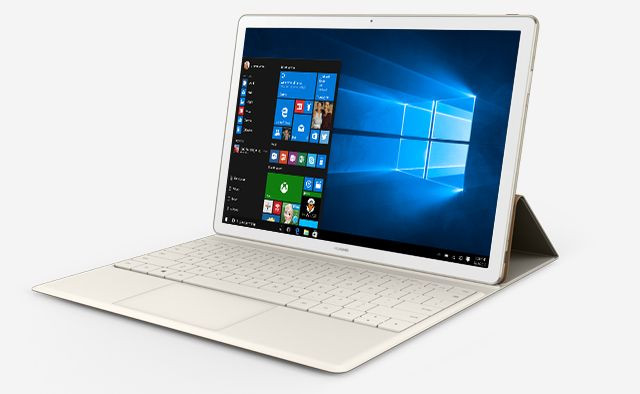Huawei MateBook: A 2-In-1 Windows Tablet Competing With The Surface 3 Starting At $700

Huawei Technologies is entering the crowded market for premium convertible tablets with a direct challenge to the Microsoft Surface and Apple iPad. The Chinese tech manufacturer has limited reach in the United States, but that could change with the release of the MateBook. The two-in-one convertible tablet starts at a price of $699 with a build quality associated with the likes of Apple, Samsung and other high-end manufacturers. Preorders are being accepted at the Microsoft Store, with general availability beginning July 11.
The Huawei MateBook will be available at the Microsoft Store, Amazon and Newegg. For Huawei, it's a big push to enter the consciousness of the American consumer. Part of the problem is a lingering stigma regarding a potential threat to national security. In 2012, several reports highlighted security flaws within Huawei routers, while U.S. officials have labeled Huawai a potential security threat. As a brand, Huawei has been limited to its budget line of Honor smartphones, the Huawei Watch, the Huawei P8 Lite and the Google Nexus 6P. With the MateBook, Huawei now counts Intel and Microsoft among its partners.
“Even though it has been tough to enter the U.S., we are having great success elsewhere,” Yanyan Ji, vice president of marketing at Huawei USA, told International Business Times at a MateBook press event Monday in New York. “We are constantly pushing the boundaries. We have brought the Huawei Watch, and when Google wanted to bring their premium smartphone, they chose Huawei.”
The Huawei MateBook was revealed at the Mobile World Congress 2016 in February. At the time, Huawei described the MateBook as the tablet for consumers looking for a powerful, ultraportable and attractive device. The MateBook is slimmer than the Apple iPad Pro and lighter than the iPad Pro and Microsoft Surface. Huawei has chosen an aluminum unibody design instead of a cheaper plastic case.
Powered by Intel's Core M processor, the MateBook operates on Windows 10, which includes Microsoft's suite of productivity tools and the Cortana digital personal assistant. The base model of the MateBook is equipped with a Core M3 processor, 4GB of RAM and 128GB of storage for $699. The Core M7 MateBook with 8GB of RAM and 512GB of storage will set consumers back $1,599. The portfolio keyboard is sold separately at a price of $129. The MatePen is $59 and the MateDock is $89. Battery life is estimated to be around nine hours based on a heavier workload.
Ready for its Close-up?
Huawei is committed to becoming a premium brand for consumers, with the MateBook serving as a competitor in the burgeoning convertible market. Detachable tablet sales have been growing over the past few years while other tablet areas have shown a decline, according to the IDC. Detachable tablet market share had year-over-year growth of 78 percent, with shipments projected to reach 63.8 million in 2020.
To gain traction in the U.S., Huawei is actively pursuing retail partnerships, according to Ji. The company has grown from direct consumer sales on its website to now having branded endcaps in over 600 Best Buy locations. “We are committed to building brand retail presence. With MateBook, we will be in all physical Microsoft Store locations,” Ji said.
While Huawei sells a lot of tablets, it's the third-largest smartphone manufacturer in the world, without much in terms of U.S. sales. Much like the MateBook, Huawei could surprise consumers with its highly regarded Huawei P9 flagship smartphone. In many ways, the P9 rivals the best offerings from Samsung and Apple, but a U.S. release date has yet to be announced. There are no plans to bring the P9 to the U.S. just yet, but the smartphone could be part of Huawei's next rollout, according to Ji.
“We want to make sure the product will sell well. We will have a premium product coming, but no P9 just yet,” Ji said.
© Copyright IBTimes 2025. All rights reserved.





















